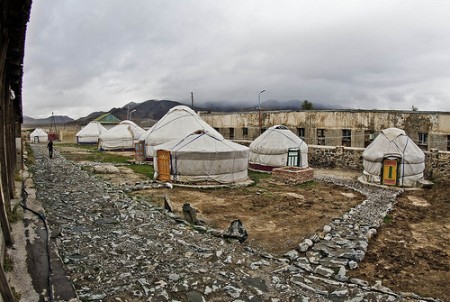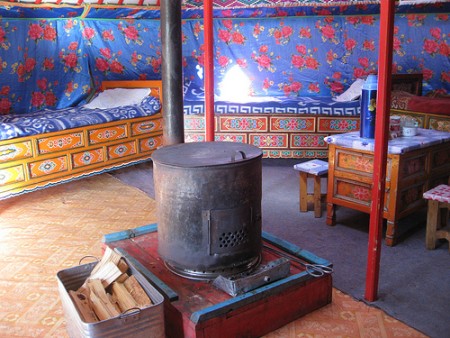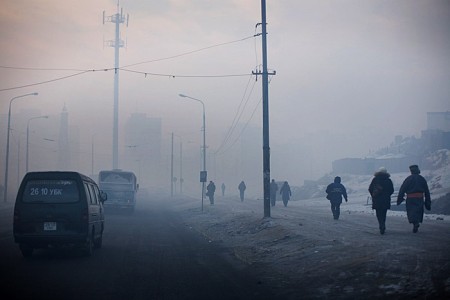Mongolians are having a tough winter this year and the air pollution from the heating stoves and coal burnings in factories is causing more problems. The citizen journalists from the Rising Voices grantee Nomad Green project are highlighting the degradation of environment in Mongolia. Optimus writes (translated in English by Azaa) how the air pollution in Mongolia's most populous city is becoming a slow poison for citizens:
A big city atmosphere is crowded with tons of gases from cars and from the ger districts and it is affected by the suns infra-red rays. After this process the pollution gets worse.
The aftermath affects our physiology, such as breathing, eyesight shock and Asthma and heart problems. If this continues, the reasons for death will increase along with the diseases.
Optimus also points to the issue of rising infant death toll:
So in order to have a baby, couples must plan the pregnancy period without crossing winter months. Or even temporary transfer to rural provinces.

A Ger camp in Mongolia. Image by Flickr user Neurmadic Aesthetic, used under a Creative Commons License
Beth Ritchey at Kiva Blog writing from Ulaanbaatar, Mongolia provides some backgrounds on gers (Yurts):
Currently around 60% of the population of Ulaanbaatar (the capital of Mongolia) lives in gers (a yurt-like structure heated by a central stove). Pollution is a big problem in Ulaanbaatar, especially in the winter when pollution levels increase substantially due to the extra coal and wood burned in the gers to keep warm. The World Bank estimates that 60% of the pollution in the city during the heating season is attributed to coal burned in the Ger Districts.

The central stove inside a Ger (Yurt). Image by Flickr user Feserc, used under a Creative Commons License
Beth also informs about 3 types of energy efficient heating solutions which can provide a solution to this problem.
The air pollution is not the main problem of the country. Gantsatsral.M writes that (translated in English by Mongoloo) the main source of income for many Mongolians are their livestock and the pastureland have become seriously degraded so the livestocks are threatened:
Mongolia has 156.4 m hectare area, 112.8 m hectare out of which is pasture-land and haymaking area. Only the livestock husbandry sector manufactures 21% of gross domestic products and 80% of agricultural products, and provides 1/3 of the working force with work and produces products worth 627.3 billion tugrug.
Due to water point and settled areas in livestock over centralization, grazing capacity overrun 1.3-11.4 times more. As a result, this area is becoming impossible for herding animals. Mining companies don’t do remediation so the pasture-land also has been destroyed.
[..] The reason of pasture-land collapse is:
* Natural disaster
* Flood
* Drought
* The excess of pasture-land
* Ill disposed usage of it
* Greed of pasture-land usage
* Not to move because of water
* No remediation of mining
* Affect of pest
* The luck of water supply etc
 Airunbulag writes how birds in Mongolia are embracing death by electrocution in electrical poles. The blogger also urges to stop the trade of falcons.
Airunbulag writes how birds in Mongolia are embracing death by electrocution in electrical poles. The blogger also urges to stop the trade of falcons.
Gerelmaa informs about (translated by Shinee) poaching of Mongolia's sacred animal – wolf to collect body parts for use in medicines:
When I called following one ad to sell wolf brain on the paper, someone replied me to come and take it. He said he would show me wolf skull to guarantee it. This kind of business is much successful near some biggest hospitals. Sellers advice you how to use its organs like decent doctors.
The blogger notes:
Europeans and Americans annihilated their wolves, and we should not make same mistake.
Battuya discusses about (translated by Shinee) the issue of the rights of native Mongolian employees who work in dangerous work environments and are underpaid and exploited.
Read more Mongolian citizen journalists take on environment related issues in Nomad Green.





1 comment
hi, this is good article. i’m going to tweet about it on @mongoliabiz. i agree smog is a major problem. mongolians all agree on it, but we are not really doing enough ourselves. this is a bit of a shame…